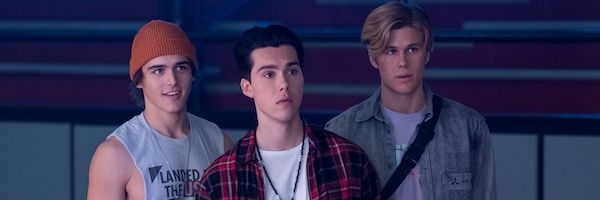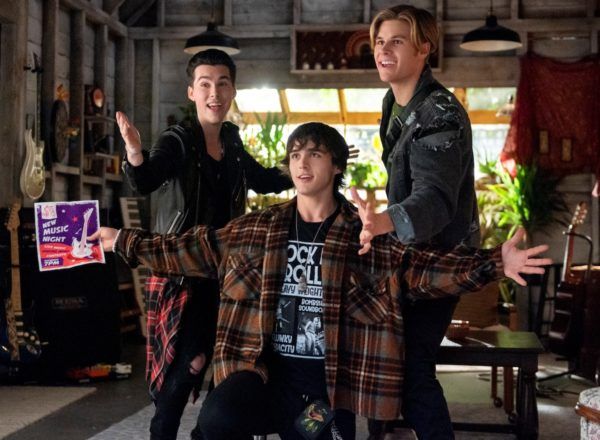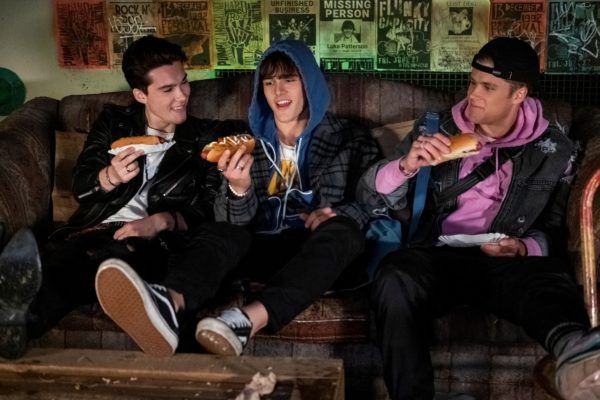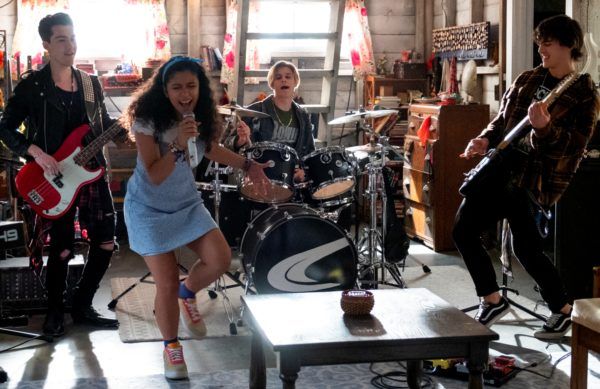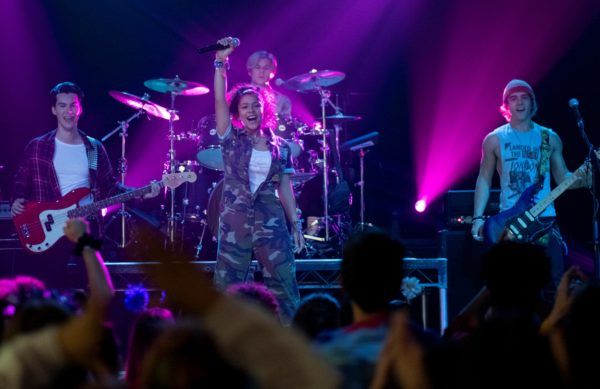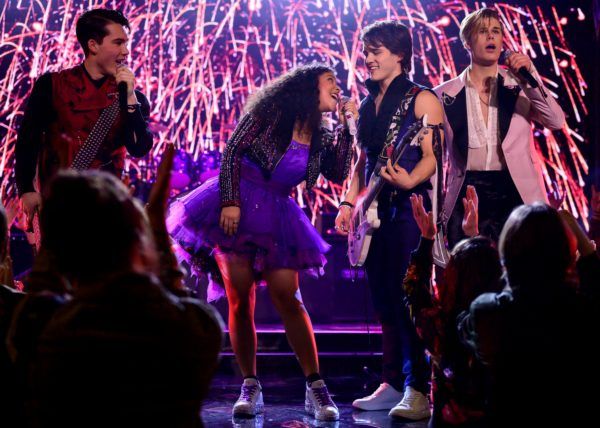[Editor's note: The following contains spoilers through the Season 1 finale of Julie and the Phantoms, "Stand Tall."]
From showrunners Dan Cross and David Hoge and director/executive producer Kenny Ortega, the nine-episode, half-hour series Julie and the Phantoms follows high schooler Julie (ultra-talented 16-year-old newcomer Madison Reyes) who’s still reeling from the loss of her mom when the ghosts of three musicians from 1995 — Luke (Charlie Gillespie), Reggie (Jeremy Shada) and Alex (Owen Joyner) — suddenly appear. Their passion for music reignites her own and as they start to write songs together, they quickly realize that while they’re performing, they’re a little less ghostly and can be seen and heard.
During a series of interviews with Collider, the Phantoms themselves – Charlie Gillespie, Jeremy Shada and Owen Joyner – talked about why this project appealed to them, picking the song they auditioned with, how band boot camp helped them to bond with each other, getting to perform original music, learning more about their characters’ pasts, the Luke-Julie dynamic, working with the special effects, the show’s message of the importance of family, and their hopes for a possible Season 2.
When this project came your way, what got you most interested in it and excited about it and what made you most nervous about the whole thing?
CHARLIE GILLESPIE: I got the script and at the end of it, I got chills because the relationship between these three boys and this girl, right after “Wake up,” I just knew it was gonna be something that I was gonna love. Family and friends mean a lot to me, and my friends are family, so it’s nice to share that message with people. And Luke is a bad-ass. He’s a guitarist from the ‘90s, and a lot of my favorite bands are from the ‘90s, and the ‘80s as well.
JEREMY SHADA: Definitely just trying to pull things off. That was the thing that got me the most nervous. There are these huge bombastic numbers and you just wanna make sure that everything looks great and you’re playing the right thing, saying the right line, and selling it. It was also exciting, just from the fact that you were getting to work with Kenny Ortega, who has such a vision for everything. He’s such a nice person to work with. He’s so humble. He’s so genuine. He’s like an Energizer bunny. He has so much energy and that just ends up rubbing off on everybody else around him. The energy that you get from him, you wanna put right back in the project. He has such a passion and vision that you can’t help but get excited and it makes 15-hour shoot days feel much shorter. Just the fact that we got to become a literal band in the show is awesome. There are not a lot of times where you’ll have multiple things that you’re interested in, that coincide in the same relationship. I sang and played bass before the show but getting to do that as well as act in something was a dream come true. And then, getting this boot camp where we all became a band and had these amazing teachers extend our abilities and skills, by the time we started shooting, you just felt confident to rock out.
OWEN JOYNER: The thing that I was most excited for and nervous about was Kenny Ortega. It’s a Kenny Ortega project. I was freaking out. I remember the first audition, I went in and I was making them laugh and I was feeling pretty good. When they had originally called all of the drummers in, the drummers didn’t have to sing. Luke had to sing, and Reggie and Julie, but the drummer didn’t have to sing. I went in and I made them laugh a little bit and I did the sides. It went well and I made them chuckle. And then, I was like, “Icing on the cake, I’ll ask them if they want me to sing.” They said yes, and I started my song and forgot all of the lyrics. I embarrassed myself so bad. I was looking right in Kenny’s eyes and I got so nervous in that minute that I absolutely bombed. I did not think I was gonna get a callback, but I did.
When a cool project like this comes your way, is it hard not to get attached to the character before you’re even cast?
SHADA: That’s a good question. There are some audition processes that I’ve done that were more lengthy, where you go back in seven or eight times for the role. I feel like whenever that’s the case, it really sucks when you don’t get it. If you feel like you’ve gone through that process with that character and you feel like you’re just about there, and you don’t get it, you’re like, “Oh, dang it!” But for this, my first audition was in front of Kenny and our showrunners, Dan [Cross] and Dave [Hoge]. And then, after that meeting with them in person, I had to sing a song and do the acting scene, and I had to sing and play bass, at the same time. I played the song “Youngblood” by 5 Seconds of Summer. After that, a couple of days later, they called me and said that they wanted to test me for it.
All I knew of it was that it was a Netflix show, Kenny Ortega was doing it, and the character would sing and play bass and was really funny. It was everything that I could possibly want in a role but I didn’t know the character. I literally only read one audition scene. You just know that it’s something that you probably would definitely want to do but you don’t really know a lot about it yet. And then, through the mix and match at the test, getting to interact with the other cast members and characters, I got a little bit more information about the show. Reading the first actual episode, I was like, “This is gonna be really cool. I wanna be a part of this.” It’s that fine line of hoping for the best but expecting the worst, just in case you don’t get something. That’s always the link you draw. So it was nice, during testing, at the end of the second day, Kenny told us that we were the band and we didn’t have this waiting period. We just got to know right away, which was so awesome, and so exciting and surreal.
JOYNER: Oh, absolutely. I call it my little miracle project. It was the pilot season where my show [Knight Squad], after two seasons, got canceled and I was at that the age where all of my friends were going to college and I was sitting there like, “Well, am I gonna be a child star, or am I gonna be able to do this as an adult?” That whole pilot season, I was just so nervous. I was so lucky when I got the audition. It just fit me perfectly, with the sarcasm and the way he talks. I really fell in love with the character and the music. Being able to play drums and sing a little bit with the comedy, it was right down my lane, so I did not wanna work myself up too much or get too excited for it. I was bracing myself for disappointment.
How did you pick the song that you auditioned with?
GILLESPIE: You pick a song that you’ve played. I’m more of an acoustic guitar guy but because Luke is an electric guitar guy, I had to go rent an electric guitar. And so, I started off with a Shawn Mendes song that was pretty soft, and they were like, “Do you have anything that’s a bit more upbeat?” And so, I did the Backstreet Boys song “I Want it That Way.” They were really happy with that.
SHADA: When you’re doing a song that you have to perform live and it’s only vocals and bass, and you don’t have guitar, piano or drums, you have to pick something that works to
both of those strengths because you’re mainly just trying to show that you can play bass well and sing well. That song, “Youngblood,” is one that I really love and there’s a really cool driving bass line. The first verse and chorus are pretty stripped back. It’s mostly just bass and vocals, and there are not a lot of songs that do that, so I felt like that was a pretty good song. Plus, it’s pop but it has a little bit of a rock edge to it and I felt like that was gonna work well for a character that was a rocker from the ‘90s.
Owen, what was the song that you were supposed to sing, if you had remembered the lyrics?
JOYNER: It was “Sunday Morning” by Maroon 5. I had no guitar or anything, so it was just a cappella. It was rough.
Charlie, you’ve previously said that you started performing at open mic nights to build up your confidence. What is that kind of experience like? What do you get from doing something like that?
GILLESPIE: It was beyond what I was expecting from it. I got to really go through something that Luke went through, back in the ‘90s. It was something I’d always wanted to do because my siblings do it all the time. I’m the youngest brother and I always wanna be like my brothers, so I was really excited to do it and I got to meet a really interesting gang of people around Los Angeles. There’s so many different worlds in Los Angeles that you can be a part of one and never interact with some folks, but then once you join it, you realize that it’s a big family. The entertainment industry is one but there are thousands of them. That was really cool. I got to join a new family in Los Angeles and that was fun. There are so many, all around Los Angeles, but you have to find them.
Jeremy, did you ever have a moment of worry that you guys wouldn’t all get along as a band?
SHADA: I think that’s always in the back of your head with any project, especially if it’s something that ends up being successful and you have to spend years, or at least six months, seeing them all day, every day. That’s always in the back of your head but luckily, even from the test, I got to know the other cast members – Charlie, Owen and Maddie – during the test and they all seemed really, really great. They’re all really talented. It was just really nice that we had our little two-month band boot camp because we got to get to know each other quite a bit without shooting scenes. And Kenny does such a great job with casting great people, not only who are talented but who are the nicest, most down to earth, really genuine, really fun people. At this point, I’m so close with the cast. They came to my wedding. Maddie is like my little sister. I couldn’t have asked for a better cast to be with, and also band to be with. Doing music with them and doing anything with them is just fun. We goof around a lot.
Owen, did you have a moment when you felt like the band really clicked, for real?
JOYNER: Unfortunately, I’m the guy that’s always in the negative. I’m the guy who would do the scene and then run back to video village to watch it back, and then I would always tell Kenny, “One more. I can do one more.” I never think that I’m doing good enough. Throughout the entire audition process, I was just freaking out. It was honestly one big blackout. Everybody talks about all of these memories but I was so focused and so nervous that I literally forgot all of it. It was intense and scary. We were just given a little demo of “Bright,” and we had to take that and learn our own instruments based off of that, and then come together with 15 different kids and get mixed and matched with that. And then, we had to play together on beat, in front of Netflix. I was just trying to keep it together that whole two days.
How fun is it, as a performer, to get to do original music?
SHADA: It’s amazing. You get to really hear the whole process. We heard the rough demos of all of the songs right before we started doing our rehearsals. In the rough demos, they sound good but you get the very basic instruments and someone else singing the lines, so that you can learn it. It’s catchy but it’s a process to see it go from that to finally getting to be in the recording booth to put our vocals on it, and then putting the final instruments on top of that. Seeing that process come together has been awesome. It’s crazy that in a short amount of time, we recorded an album and then basically got to tour it, meaning playing it in front of a bunch of extras on set when we were shooting. It was cool. It also a great way to not just get to know your band members while you’re recording an album but to also get to know your cast and creatives. You grow really close being you’re seeing the ups and downs while we’re all in the booth together. Even when one of us wasn’t specifically in the booth, we were watching each other and encouraging each other. You hear each other on key and off key. You hear the good, the bad, and the ugly. It’s a safe space because of that. You know everybody’s strengths and when someone is knocking it out of the park, you’re just cheering them on. It creates a really creative environment. I’m surprised that they even gave us as much input that we’ve had. That’s probably definitely to do with Kenny Ortega. He really loves having input from the cast and makes sure that you feel like you’re really involved in it and not just saying lines on a page.
JOYNER: It was definitely a learning curve, at least for me. I hadn’t picked up drumsticks in seven years or something, and I had to do as much drums as I could, before I even started the show. Right when we started the show, we were dancing at the same time that we were learning the songs and the harmonies, and then we were going into a recording studio and recording it. I had never done that. All of it was pushing me outside of my comfort zone, the entire time we were shooting all of it, but it was awesome. That’s the magic that Kenny has. He cares so much about you. If anything is going wrong, he’s stop everything to talk you through it, while he’s completely pushing you outside of your comfort zone. It was awesome. I’m a completely different person, having learned a whole new set of skills.
Did it feel very different to go from doing your first performance together in the show to then doing the last performance?
SHADA: A hundred percent. It was exciting, for different reasons. The first performance that we did, as a band together, was “Bright,” which was also the song that we actually auditioned with in the test. It was a weird, surreal moment of performing the song with a bunch of different versions of this band, when we were mixing and matching and testing, and then to finally be the band, be the cast, be on set, and actually get to perform it, was really exciting. That made it a special moment. That was early in the process. By the time we finally got to the finale song, “Stand Tall,” it was a bittersweet thing because it was the last. We’d been rocking and doing these performances for four or five months now, and it was the last one. It was almost like the last night of an awesome tour, and you have that thing where you’re like, “This is so exciting. This song is awesome and we’ve been waiting to perform this one. It’s the finale, so we’ve gotta make it good and make it big,” but it was also bittersweet because by the time we were done shooting it, we were done with the whole first season. It’s like that stage high that you get where it’s so exciting, and then right afterwards you’re like, “Oh, man, I miss it.”
With Luke, we get to see how much his past really haunts him, especially with the pain and grief of his family. What was that like for you to be able to get to explore that side of him and to see how much he’s being affected by what’s happened?
GILLESPIE: It explained his passion a little more, why he’s doing what he’s doing, and why he cares for it so much and craves it so much but it was hard, as well. At the end of the day, I was really happy that the boys [Dan Cross and Dave Hoge] wrote something like that for my character. I was really happy that, in a family show, we got to discover that side of things because families go through a lot. A lot of families experience some type of trauma and sometimes it’s unspoken.
We don’t get to see too much of Reggie’s past or learn about his family, in the way that we do some of the other characters. Do you know more about his backstory than we’ve gotten to learn about, or is he still a bit of a mystery to you?
SHADA: That’s a great question. There is more that we were gonna learn about him in season 1, initially, but we had to really condense stuff. There’s so much that you’re doing in the first season when you’re setting everything up that we didn’t end up having time for it. Hopefully, knock on wood, the goal would be to get to see a lot more of his backstory in a season 2, if that happens. That would be really awesome. I do know a good amount of it, personally, which is fun. Dan and Dave, the creators, told me a lot about what they were imagining for his backstory and what they wanted to do. It’s nice knowing that as you’re going through the season as an actor, even if the audience doesn’t know that yet. It’s nice knowing a little bit more of his backstory. It’s fun. I also think it will lend really well, if we do more. In some ways, it’s fun to save some of that stuff for a little bit later. As an audience, you don’t really know much about this person, but later on, you’ll get that fleshed out a little bit and you’ll go, “Oh, okay, that’s why he’s like that.”
Charlie, there’s clearly a bit of a spark between Luke and Julie but it’s obviously not something that either of them can explore because of the whole ghost thing. Is that something that you want to dig into more in the future?
GILLESPIE: We explored it in a very friend-esque way. What I love about it – and I think this happens with most people and it should happen because it’s a very natural way to happen – is that Julie and Luke are really good friends. In a way, they’re really best friends. I think everybody, before you dive into a relationship, should be best friends with a partner. Clearly, they’re feeling things for each other but they were friends, with nothing else, and I love that story.
Owen, your character gets a bit of a romance in the show that also teaches the viewers about some of the ghost mythology. What was that like to explore and was it refreshing to play a young gay character who’s open with who he is and having his friends and bandmates be accepting of it?
JOYNER: It was awesome. It took a little bit of pressure off of me, obviously. I wanted to do a good job and make people proud and happy to watch that character in the show. It was also awesome because the romance I have is with Booboo Stewart, so it wasn’t that hard to get into character. All of my friends are jealous, no matter who they are. It was awesome. It was a lot of fun. I’ve only done Nickelodeon and I hadn’t had a chance to really have a character that went into too deep of a romance, so it was fun to explore it and to act.
Charlie, the songwriting process and putting lyrics to music is a mysterious thing for people who don’t do it. Was it fun to get to explore some of that in the show?
GILLESPIE: You see it a few times in the show. The way it happened with me and Madison, and eventually even the boys helped out a bit, was real. It was so close to the way Luke and Julie probably write in the show. That was an experience I would never, ever give up. I was playing a character with this girl, and this girl and I go out and write a song, as Charlie and Madison, that gets performed as Luke and Julie. It was so perfect but it was challenging. Nobody knew on set, other than me and Madison, and eventually Jeremy and Owen. It was just this little secret that we had. On the day, everyone was like, “Are you doing it today?” And we were like, “Yeah, we’re doing it today.” Everyone was giving us pats on the back. We worked a lot. It was really hard. If we had a quick break, we’d leave and go pick up a guitar. It was something really special to us. It’s the first song that we ever made, so it’s something that me and Mads are gonna cherish forever, one hundred percent, and the boys as well. It was cool.
With the added element of you guys being ghosts, there are some special effects involved. What’s it like to have to work around the effects for the poofing in and out, the walking through walls and doors, and having people walk through you?
GILLESPIE: It’s cool. It’s more fun, at the end of the day. It’s embarrassing and funny. On set, you have to run off. You’re with the boys, so everyone is laughing and making good fun of each other, which is always a good time. It’s just good memories, watching the whole series. You spend all of this time doing something, and then when you put it together, all it lasts is like four and a half hours. Every little take or something is just another memory of another day.
SHADA: The weirdest part is seeing it back later because when you’re on set doing those things, we did them all the time, so you get used to it. Now, especially after having watched the season with the special effects in there, I’m like, “Oh, crap, I wish I would’ve done my poofing a little bit differently.” When you’re on set, you have no idea what it’s gonna look like. I feel like Owen does the least in his poofs. He’s the most chill with his poofs. I didn’t know whether to fully commit or be chill with it, so mine were in the middle. And then, Charlie’s poofs in the show are the most huge and ridiculous. On set, every time he would do a poof, I was like, “They look so cheesy. Is that gonna look super dumb?” And to Charlie’s credit, in the final thing, his look the coolest. His poofs look awesome.
It’s funny how on set that stuff can look so weird but then when it’s done, you just gotta trust the VFX people that they’re gonna make it look cool because they always do. When we would shoot those, you’d have a take where it’s just a plate of the set. And then, you’d have a take where whoever is acting off of us is pretending that we’re not there. And then, there was a take where it was just us and they would put it all together. So, there were a lot of times where people were talking to people who weren’t there, and you get used to it. They would literally just say, “Freeze, and poof,” and we would walk off frame. It’s hard not to laugh at that.
JOYNER: The poofing looked absolutely ridiculous. You would just hear Kenny go, “And poof!” You didn’t know what the hell it was gonna look like afterwards. It looked amazing at the end of it. It looks so cool and real, which was sweet. We were nervous the whole time. No one's poof matched. We had to do these scenes and everything we wanted to do, down to touching something, we would have to go back to the writers and ask, “Can we touch this? Can we grab this? Can we do this? Can we sit on this couch like this?” It added a whole new layer to acting that I didn’t even know was gonna be there. I remember seeing the first poofs and we were all just huddled around an iPad, and the special effects guys came in and showed us, and it was sick.
At its core, this show does have a really beautiful story of love and loss, and it’s about finding a family that may not be blood but can be just as important to you. What did you most enjoy about exploring that family dynamic and showing that family can come from anywhere?
SHADA: It’s just the great message of the whole story. Even if you have an awesome family – and I love my family – there are still people that are your found family, that you meet and you both choose to be friends with each other and become family for each other. Those people end up meaning so much to you. Especially in the context of our show, they all come from different backgrounds. The ghosts were outcasts in some way, shape or form, but they come together and they don’t really need these other people because they become their own family and they make the best of it. That love of music is what ends up tying them together, especially with Julie. That’s the best message of the show. It doesn’t matter if this person is technically related to you but you can have family wherever you can find family.
JOYNER: Specifically, my character is full of anxiety. He’s always nervous and doubling back and checking himself, and it’s the same with the other characters. We’re all going through our own struggles. Luke with his family, Reggie with his, and Alex’s own problems. I think it’s cool that kids will be able to watch this and, even if it’s not going the best at home, they know that if they’re feeling bad, they can go lean on their friends a little bit. I like that we come together and lift each other up. At the end of the season, you can see that, even though there are a lot of issues, like in life, your friends are gonna be either to help you through all of that.
This season ends on a couple of big cliffhangers. What was your reaction when you found out how things would end and where these guys would be left?
GILLESPIE: I can’t wait to see what happens. I can’t wait to see where it goes. I can’t wait to see Luke’s power develop. I want his powers to grow. I wanna be able to levitate things and levitate myself. That seemed like a fun special effect thing to do. We really got to do some fun things in season 1. We got to write a song. I got to write a couple of guitar parts. We’re a band now – the boys and Madison and I – and we’ve been acting like a band since day one. We’ve been writing things together and we wanna write for the show. We wanna get things in the show. We’re really looking forward to that experience. We wanna do that. We wanna see a future for the band as well as the show. It’s such a blurred line. Sometimes we forget that we’re doing a TV show, the way we play our music. That’s what’s cool. It makes it a lot more believable for us because we’re lost in it sometimes.
SHADA: It was one of those things where we read it and instantly, as a cast, we were like, “What does that mean for the show going forward? If we do more, how is that gonna affect the show? Is that a permanent thing? Is it temporary?” Honestly, we have no idea. I’m excited to see what they do with that. I can’t imagine that would be a permanent thing because we’re still ghosts. I don’t know how that’s actually gonna work. It’s fun having little cliffhangers. Obviously, the very last cliffhanger, with Caleb doing his possession, is gonna be a lot of fun. Nick will have a nice little thing to do, if we go forward. It’s gonna be fun seeing him try to channel a little bit of Cheyenne Jackson. I think he’ll have a good time with that. I love having cliffhangers.
JOYNER: I had a ton of questions, obviously. If there is an idea for season 2, I don’t know what it would be. I’m left in the dark, too. I wish I could tell you something. When I watched the series, I forgot that I was in it. I was so invested in a lot of the things. Because Maddie is a minor, a lot of the other characters that are a part of her world are also minors, so that it’s easier to film. The boys and I are all adults, so a lot of the times, we would film different things. Unless it was the table read where we were all reading through the entire script together, I forgot about a lot of the scenes. Watching that huge cliffhanger at the end, I was sitting in bed sick and I got so excited that I jumped out and I was like, “Yeah, let’s go!” I was always sad when there wasn’t another episode. I guess we’ll see what happens.
Julie and the Phantoms is available to stream at Netflix.
Christina Radish is a Senior Reporter of Film, TV, and Theme Parks for Collider. You can follow her on Twitter @ChristinaRadish.

